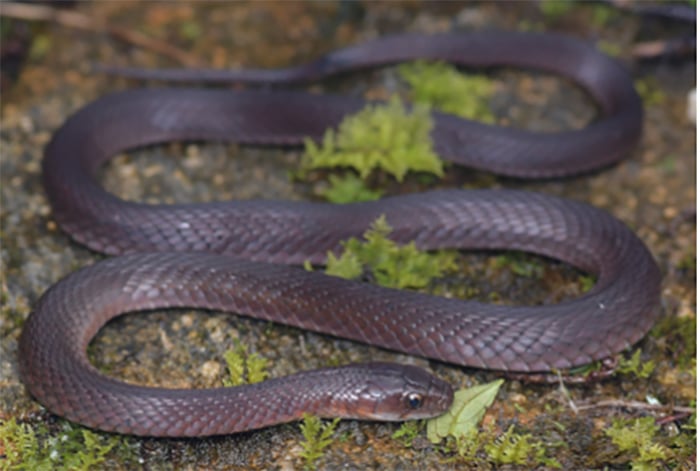The snake is named the H’mong keelback snake (Rhabdophis hmongorum) in honor of the H'mong people.
Luan Thanh Nguyen and the Zoological Society of London’s Lead Herpetology Keeper, Daniel Kane, were looking for amphibians 2,800 meters above sea level in northern Vietnam when they came across two H’mong porters, Chang A Sung and Pao A Vang who had found a small, metallic purple snake. The snake had an orange neck and a pale line along its upper jaw. They were cautiously excited that a new snake species was discovered, but it wasn’t until photographs and measurements of the snake were sent to the team at the Zoological Society of London for study that the snake was indeed a species new to science.
The ZSL determined the snake was a keelback, medium-sized semi-aquatic snakes that are native to South, East and Southeast Asia. These snakes are known to produce venom and are also poisonous, storing toxins from the toads and fireflies that they eat in their neck glands.
“This was not the only thing that the analysis revealed. The number of scales in key areas of this snake – along with its body colour and the place where it was found – did not match well with any description or photographs of other keelback species that we were able to find,” Kane and Nguyen wrote in a post on the ZSL website. “It was starting to look like we could have something special.”
DNA analysis determined the snake’s position on a “tree” of its closest relatives. The analysis confirmed the snake belonged to the genus Rhabdophis, the keelback Colubridae family of snakes found mostly in Southeast Asia. it also confirmed that it is different from its closest relatives by as much as 4 percent.
Tiger Keelback Snakes Know When Their Bodies Contain Toad Toxins
New Species Of Keelback Snake Discovered In India
“Finally, after using the morphology of the snake in conjunction with its genetics – both of which showed clear differences from other species – we could confidently state this ‘new’ snake had indeed not yet been described by science,” Kane and Nguyen wrote.
The snake was found in the Hoang Lien Mountains, in which the H’mong people also live. The snake was named after the H’mong people in their honor. The researchers found a single record of a keelback from China that was a near identical match to the H’mong keelback snake. The scientists who did the DNA analysis didn’t name it or provide any other data regarding the snake, so the researchers believe that the snake may also be living across the border in China.
An abstract of the snake can be read on the Zootaxa website.



